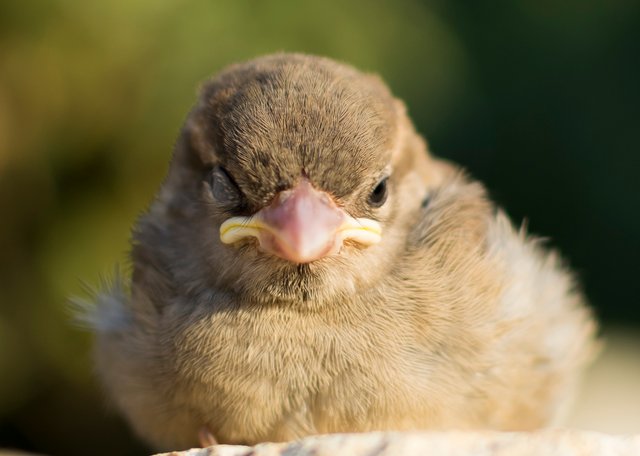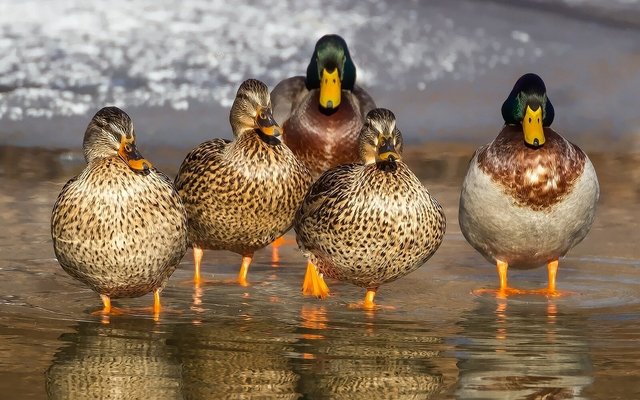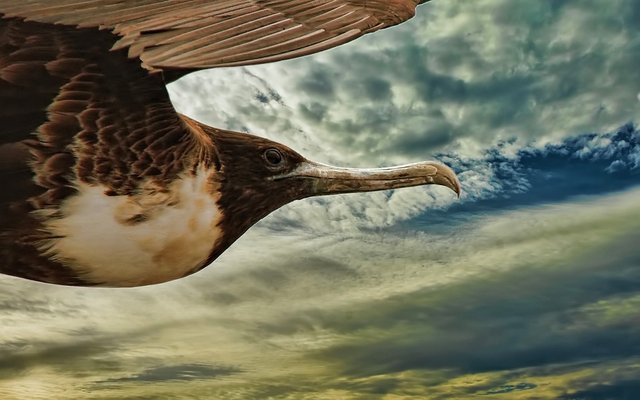The art of staying half-awake: unihemispheric sleep keeps ducks (and humans) safe
Imagine being able to fall asleep with half of your brain while the other half still functions. Wouldn’t that be interesting!
Several animals seem to be capable of doing this, and even human beings have been observed to do it in some special circumstances. (More on that later.) In fact, on some nights of your life, half of your brain may have gone to sleep leaving the other half awake when you imagined you were completely asleep. It does give a whole new meaning to the term “half-asleep.”

Half asleep! Birds sometimes sleep with one of their brain hemispheres wide awake. They shut one eye when this happens.
Image By Hussain Kaouri [CC BY-SA 4.0 (https://creativecommons.org/licenses/by-sa/4.0)], via Wikimedia Commons
Unihemispheric sleep
This post is going to be about this interesting phenomenon of partial sleep of the brain in case of ducks. While I was writing my last post about the sleeping habit of ants, I came across the phenomenon of unihemispheric sleep, which I mentioned in the post, but did not discuss in detail. But then it intrigued me enough to make me look for more information on the topic.
The term unihemispheric is coined from uni which means “one” and the word hemisphere. Thus, unihemispheric sleep refers to the act of sleeping with only one "hemisphere" of the brain instead of the whole brain.
Ducks that lose (some of their) sleep to stay safe
A study on the sleeping habits of mallard ducks published in 1999 talks about how the whole thing works in birds. It is published with the title of "Facultative control of avian unihemispheric sleep under the risk of predation", and that sounds a little intimidating, but the whole point is that mallard ducks can choose to sleep with only half of their brains if there is a risk of getting killed. That way, they can keep one of their eyes open to see an approaching predator.
I have certainly been scared to fall asleep on some nights, and I would have gladly liked to keep half of my brain awake.

Mallard ducks in a line
Source: pixabay
Questions
There are two logical questions about the whole experiment that you are probably asking at the moment.
- How did the researchers know that the birds were sleeping with half of their brains?
They collected data on the electric activity of the brain hemispheres and also, they could just look at the eyes of the ducks. When a duck is sleeping with only half of the brain, it closes only one eye. The eye and the brain’s “hemisphere” do not match though; the left eye remains open when the right hemisphere is asleep and vice versa.
- How did they determine that the purpose of this unihemispheric sleep was to avoid predators?
This one is interesting: When they had the ducks in a long line and watched them fall asleep, the birds at the very end of the line went to unihemispheric sleep whereas the other birds allowed both halves of their brains to sleep. Also, the bird at each end of the line kept the outer eye (the eye looking away from the other birds) open. This shows that the birds were basically looking out for danger that could approach the group. The birds at the end of the line were acting as guards, and they were willing to lose their sleep for the job.
Why is this important?
This information can have important implications for sleep research in human beings, and since sleep is one of the least understood biological phenomena, any insight is valuable insight.
Here, the ducks seem to be aware of the need to go into unihemispheric sleep since the birds at the very edge were more likely to engage in it. This in itself shows that the different regions of a vertebrate brain can be put into sleep independently.
And then we have the sleep disorders that need to be taken care of. You might have heard of insomnia before, but then there is also parasomnia which refers to a whole group of disorders that involve abnormal movements, emotions, dreams, and perceptions during sleep. To give an example in simple terms, we can think of sleep-walking. A part of the brain is definitely actively working if you can manage to get out of bed and walk around like it’s not even a big deal that your eyes are still shut. So it is already an example of partial sleeping in human beings.
If we want to have more insight into such disorders, studying the ducks can be a good idea. Some scientists already suggest that parasomnia may represent a protective role in human beings too.
Is it always a disorder in humans?
Not really. It has been shown that unihemispheric sleep also comes into play as a protective maneuver in human beings. And it is an explanation of a common experience for many of us: Why do we toss and turn in an unfamiliar bed? It turns out that when we are in an unknown bed, the brain goes into a protective mode and does not let the left hemisphere go into a deep slumber. We do not keep our eye open, but we seem to have half of our brain much more responsive to stimuli such as noise when compared to the other half. And it happens only on the first night in the unfamiliar bed which aligns with the idea of the protective function of unihemispheric sleep. If you survive one night of sleeping in that strange bed, the brain assumes you will be okay from the next night.
Other instances
Here is an interesting problem. Whales and dolphins live in water but cannot breathe in it. So the question is how do they sleep without drowning? And then there are the frigatebirds that fly over the ocean for weeks without landing for rest. So how do they manage to survive without sleeping? The answers to both of these questions appear to be unihemispheric sleep. I have a post on dolphins and frigatebirds planned, so you can write in the comments section to let me know if you would rather read about ants instead!

Sleep in the air! Frigatebirds fly for days without landing and get their sleep (some of which is unihemispheric) during their flight.
Source: pixabay
Links to references and image sources are provided in the text.
Dolphins do this too - I found this amazing. It makes sense though, seeing as they need to come up for air fairly frequently
Yes, I am going to talk about dolphins in detail next. Thank you for reading.
Oh wow, I've never heard of uni-hemispheric sleep. Some really interesting stuff. Thanks for sharing :):)
I'm glad you found it interesting. Thanks for reading! :)
Hello @zycr22
This is indeed a very interesting phenomenon!
I've often heard of the saying sleeping with one eye open ... but flying and unconsciously doing an activity when sleeping.... that's amazing.
I didn't know sleep waking had a deep meaning tied to it. I thought it was as a result of stress or just a habit.
I look forward to your post on dolphins and frigate birds.
Thanks for sharing!
@melanie00
Thank you for the comment! I'm glad you enjoyed it; I will probably be done with the other post in a day or two.
Wow! I love this topic today. Talking about the brain been sensible when we are in strange bed. I've had the experience severally. I go to camps a lot. But the only difference is that you said the 'brain assumes one will be OK after the first night'. Well, mine is different in that if am at home, it might take a longer time for you to wake me up. But once am camping or in a strange bed, I wake up at every slightest sound I hear until maybe after 4 or 5 days.....
Nice research friend... 👍
Thank you for reading and for the comment! I'm sorry your brain is so sensitive to the strangeness of your bed. The research obviously looked at the "averages" while deciding that the brain gets comfortable after the first day. It's not your fault for being a possible outlier. :)
Hey - I did it just yesterday. I took a nap in a chair while a football game was on. My husband asked me a few questions and i answered without even waking up.
Oh wow, teach me how to do that? Thank you for reading. :)
Flying while half asleep? Oh, my. Birds live on the edge!!! Glad you manahed to write. Its an interesting metaphor... sleeping with one eye
Ps. I forgot to mention that im curious about whales and dolphins and think yiubcould make some great science tinged jabs at our own ecosystem--- but i love the insane things i warn about ants from you. Aslo how you relate it all to humans. So funny. Frigate birds seem interesting too tho. Lol ANTs first then whales then birds
Thank you for reading and for the comment! I don't know whether I will be able to reference the steemit ecosystem, but try reading with it in mind and let me know! Ants, birds, whales, humans, they aren't that different. :)
interesting. I enjoyed every bit of it.
Thank you for reading.
@zycr22 So...somewhere along the way some mad scientist managed to rewrite my DNA and gave me Duck n Dolphin powers with the touch of a frigate bird. lol
I will be looking out for a research from your hand on the insomnia matter. You gained a fan!